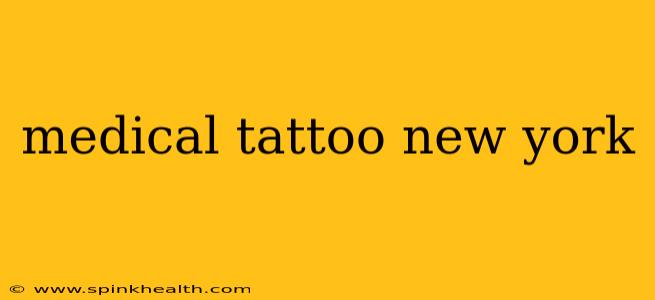The bustling streets of New York City hold a hidden world of medical innovation, including the increasingly popular practice of medical tattooing. Forget the rebellious imagery of traditional tattoos; these are tiny, discreet markings serving a vital purpose: providing crucial medical information at a glance. This isn't about aesthetics; it's about potentially life-saving accessibility.
My journey into this field began with a personal experience. A close friend, a severe diabetic, found herself in an emergency situation where vital information about her condition was lost in the chaos. This near-miss sparked a deep curiosity about medical tattoos and their growing significance. I delved into the research, spoke with medical professionals, and discovered a fascinating world of precision and practicality.
What are Medical Tattoos?
Medical tattoos, also known as medical alert tattoos, are small, permanent markings containing essential health information. This information might include allergies, medical conditions (like diabetes, epilepsy, or heart conditions), medication sensitivities, blood type, or emergency contact information. These tattoos are typically discreet and placed in a readily visible location, like the inner wrist or ankle.
Unlike traditional tattoos, the focus isn't on artistic expression. Instead, the priority is clarity and permanence. The information is usually encoded in a simplified format, often using standard medical abbreviations or symbols for maximum efficiency.
Who Needs a Medical Tattoo?
While anyone can benefit from having readily available medical information, medical tattoos are particularly beneficial for individuals with:
- Chronic conditions: People living with diabetes, epilepsy, heart conditions, allergies, or other chronic illnesses can greatly benefit from having this information readily accessible in an emergency.
- Individuals prone to emergencies: Those at risk for seizures, anaphylactic reactions, or other life-threatening conditions.
- Non-verbal individuals: Medical tattoos can be invaluable for individuals who are unable to communicate their medical needs verbally.
- Children: For young children who may not be able to articulate their needs during an emergency.
Where can I get a Medical Tattoo in New York?
Finding a reputable practitioner for medical tattoos in New York requires careful research. You'll want to find a licensed and experienced tattoo artist with a demonstrated understanding of the medical implications of their work. Asking for references and checking online reviews are essential steps in your process. It’s crucial to ensure they adhere to strict hygiene standards to prevent infection. Remember, this is a permanent marking – choose wisely.
Remember, this isn't a substitute for carrying medical ID, such as a MedicAlert bracelet. Instead, it acts as a supplementary form of identification, especially helpful if a bracelet or card is lost or inaccessible during an emergency.
Are Medical Tattoos Permanent?
Yes, medical tattoos are permanent. This is precisely their value. The information remains accessible at all times, unlike temporary solutions that may fade or wear off. While laser removal is an option, it's generally not recommended due to the potential for scarring and the important function the tattoo provides.
What information should I include on my medical tattoo?
This depends on your individual needs, but commonly included information includes:
- Allergies: List any known severe allergies (e.g., penicillin, nuts) using standard abbreviations (e.g., "PN" for penicillin).
- Medical conditions: Clearly state any relevant conditions (e.g., "DM" for diabetes mellitus, "Epilepsy").
- Medications: List any essential medications or medications you are allergic to.
- Blood type: Include your blood type (e.g., "A+", "O-").
- Emergency contact information: Consider a simplified version of a phone number or a reference to a pre-registered contact database.
Consult your doctor to determine what information is most crucial to include.
How much do medical tattoos cost in NYC?
The cost of a medical tattoo in New York City will vary depending on the size, complexity, and location of the tattoo, as well as the artist's fees. It's advisable to contact several tattoo studios specializing in medical tattoos to get quotes before making a decision.
This journey into the world of medical tattoos has revealed their significant potential for enhancing safety and improving emergency response. While it's a small marking, its impact can be considerable. Remember to prioritize thorough research and choose a reputable practitioner to ensure a safe and effective procedure. The peace of mind that comes with having readily available medical information is priceless, especially in the fast-paced environment of New York City.

